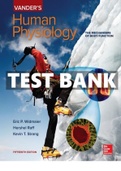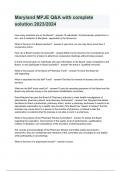Vanders Human Physiology 15th Edition Widmaier Test Bank Chapter 1 Homeostasis: A Framework for Human Physiology 1) Which of these is NOT one of the four general categories of cells that make up the human body? A) Epithelial cells B) Collagen cells C) Connective tissue cells D) Neurons E) Muscle cells 2) Physiology is the study of A) how two organisms interact. B) how organisms function. C) the spread of diseases. D) the structure of the body. E) two of the choices are correct. 3) The study of disease states in the body is called A) pathophysiology. B) anatomy. C) homeostasis. D) differentiation. E) histology. 4) Which is NOT a connective tissue cell? A) Bone cell B) Skeletal muscle cell C) Blood cell D) Fat cell E) Cartilage cell 5) What is the principal function performed by epithelial cells? A) Fat storage B) Anchoring body structures C) Forming boundaries between body compartments D) Generating movement E) Transmitting electrical signals 6) The types of cells that are specialized to communicate with other cells and control their activities are A) epithelial cells. B) muscle cells. C) connective tissue cells. D) neurons. E) Two of the choices are correct. 7) What is the term for the developmental process that leads to specialized cell types? A) Genomics B) Differentiation C) Homeostasis D) Positive feedback E) Acclimatization 8) Which best describes the extracellular matrix? A) It is found just inside the cell membrane in all tissues, it sends branching collagen fibers between cells to connect them, and it transmits chemical information from the interior of one cell to the interior of adjacent cells. B) It is a tissue having more than the four general cell types, it transports proteins and polysaccharides between body compartments, and it is the route by which chemical signals like hormones reach all parts of the body. C) It covers the body's surface, it contains connective and muscle tissue, and it helps generate movement. D) It surrounds cells; it contains proteins, polysaccharides, and minerals; it provides a scaffold for cell attachment; and it transmits chemical messengers to cells. 9) If a person begins to sweat upon entering a hot room but continued sweating is able to keep the body temperature stable, which of these best describes her condition? A) She is in an equilibrium state. B) She is not using energy to maintain a constant temperature. C) She is in a steady state. D) She is using a positive feedback mechanism. E) Two of the choices are correct. 10) Which concept is the defining feature of the discipline of physiology? A) Descent with modification B) Homeostasis C) Evolution D) Equilibrium E) Differentiation 11) Describing a physiological variable as "homeostatic" means that it A) has varied from the normal value, and will remain constant at the new value. B) never varies from an exact set point value. C) is in an equilibrium state that requires no energy input to stay at the normal value. D) is in a state of dynamic constancy that is regulated to remain near a stable set point value. E) has no normal range, but will just change to match the outside environmental conditions. 12) Which of the following situations best represents a homeostatic mechanism? A) A person who becomes very nervous begins to sweat profusely. B) After going outside on a hot day, the core body temperature increases. C) Increasing the size of fast -food restaurant portions causes body weight to increase. D) After eating a large batch of salty popcorn, levels of salt in the urine increase. E) As age increases, the amount of calcium in bones tends to decrease. 13) What term is used to describe the steady -state value for any variable that the body attempts to maintain? A) Set point B) Equilibrium potential C) Error signal D) Reflex arc E) Median value 14) Which of components of a general reflex arc are listed in the order information typically flows through them following a stimulus? A) Effector, afferent pathway, integrating center, efferent pathway, receptor B) Effector, efferent pathway, integrating center, afferent pathway, receptor C) Integrating center, receptor, afferent pathway, efferent pathway, effector D) Receptor, efferent pathway, integrating center, afferent pathway, effector E) Receptor, afferent pathway, integrating center, efferent pathway, effector 15) Feedforward regulatory processes A) work in anticipation of changes in regulated variables. B) are identical to positive feedback processes. C) lead to instability of the regulated variable. D) maximize fluctuations in the regulated variable. E) tend to force physiological variables away from their set point. 16) Which situati on describes a feedforward mechanism? A) Blood glucose returns toward normal an hour after a meal. B) The smell of rotten food on a plate triggers the vomit reflex. C) A drop in core body temperature triggers shivering. D) An increase in core body temperature stimulates sweating. E) Food in the stomach triggers the production of stomach acid. 17) What is the general purpose of positive feedback mechanisms? A) To maintain a constant internal environment B) To anticipate changes in the environment C) To return a variable toward the set point D) To bring about a rapid change in the body E) To detect changes in the external environment





